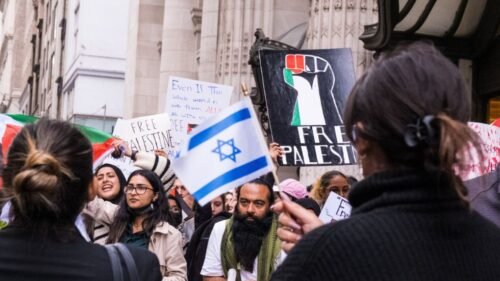On a quiet September afternoon, as Hamas leaders gathered in Doha to talk about a US-backed ceasefire plan, Israeli missiles roared in from the Red Sea and slammed into the Qatari capital. The targets were senior Hamas officials. But the strike hit much more than that. It hit the core of America’s regional strategy.
For years, Washington relied on Qatar as the go-between — the country that could talk to everyone: Hamas, the Taliban, even Iran when needed. Qatar was where messy conflicts met quiet diplomacy. By attacking in Doha, Israel not only violated the sovereignty of a key US ally but also torpedoed the very negotiations the US had been pushing to end the war in Gaza. The fallout was immediate. Qatar froze its mediation role. Arab leaders fumed. Even in Washington, President Donald Trump — normally Israeli Prime Minister Benjamin Netanyahu’s staunchest backer — lashed out, complaining that he was “not thrilled” by Israel’s actions.
This wasn’t just another flare-up in a region used to them. It was a moment that revealed something deeper: the limits of American influence, the growing boldness of its allies and the real risk of the Middle East sliding into chaos without a plan to stop it. If Washington doesn’t change course fast, it risks losing control of the region’s future.
Not just another bombing
To see why Doha matters, we need to rewind a bit. Since the October 2023 Hamas attacks, Israel has been on a relentless military campaign. Gaza has been devastated. Civilian deaths, accusations of war crimes, even famine — none of it has slowed Israel’s push. And increasingly, the war has spilled beyond Gaza’s borders: strikes in Lebanon, Syria, Yemen and now Qatar.
Doha is different, though. This isn’t some remote battlefield. It’s a US ally hosting the biggest American air base in the Middle East. For years, Qatar played mediator — sometimes the only one who could talk to groups Washington wouldn’t touch. By bombing Hamas leaders in Doha, Israel didn’t just cross a border. It shredded the basic trust holding together years of US-brokered diplomacy. Qatar’s leaders made it clear: their mediation role in the conflict is now “not valid.” Without Qatar, the ceasefire talks are dead in the water.
Netanyahu framed the strike as a message to Israel’s enemies: no one is safe. But it also sent another message — one Washington can’t ignore. Israel is willing to act alone, no matter the political cost to its closest ally.
How the US loses face
The US-Israel relationship has always been tight. Military aid, intelligence sharing, diplomatic cover at the UN — Washington has given Israel unwavering support for decades. But Doha exposed the cracks.
First, the strike humiliated US officials. Israel gave Washington only a few minutes’ notice. Too little, too late. As one American diplomat put it, “The US sought clarification, but by the time Israel provided it, missiles were already in the air.” Second, it calls US plans for a regional security alliance linking Israel and Gulf states against Iran into question. The idea had been simple: get Arab states on board with Israel, push back on Tehran and slowly move toward peace.
That vision just went up in smoke. Saudi Arabia, Türkiye, Jordan and many other Gulf and arab countries condemned the strike. Even countries with quiet ties to Israel are now rethinking things. Finally, it raised awkward questions in Washington itself. US politicians — especially Democrats — were already uneasy about the Gaza war’s civilian toll. Now, some are asking whether unconditional support for Israel still serves American interests. The Doha strike gave that debate new fuel.
Across the Gulf, the reaction was swift. Qatar’s prime minister called the strike a “blatant violation” of sovereignty and demanded an emergency Arab League summit. Even the United Arab Emirates (UAE), which normalized relations with Israel under the Abraham Accords, issued a sharp rebuke. This matters because it shatters Israel’s assumption that Arab states will eventually look the other way.
Instead, it risks driving them toward other partners — Namely China and even Iran. Beijing has already offered to mediate between Israel and Hamas and continues to call for peace in the region. Iran, of course, is thrilled with the narrative shift. For years, Tehran warned Gulf states that Israel was a destabilizing force. Now, it looks like Israel just proved its point for them.
Worldwide condemnation
Outside the region, the pattern was familiar: outrage without consequences. European leaders called the strike “in no one’s interest.” Canada stated that it is a breach of a country’s sovereignty and is “unacceptable.” The UN held an emergency meeting. In a significant diplomatic move, the leaders of six nations — France, Andorra, Belgium, Luxembourg, Malta and Monaco — announced their recognition of Palestinian statehood during a high-level summit in New York, held just before the annual United Nations General Assembly (UNGA) meeting.
Germany and Spain’s sudden decision to impose a total arms embargo on Israel is a striking exception. Apart from these rare examples, no one imposed sanctions, no one cut arms sales, and policy never really shifted. For decades, the lesson for Israel has been clear: international criticism comes and goes; real pressure almost never follows. Unless the United States itself draws boundaries, Israel has little reason to stop.
The pieces fall into their (new?) place
Of course, Israel sees things differently. Hamas killed over a thousand Israelis in the October attacks. Its leaders, Israel argues, were sitting safely in Doha, plotting the next one. From that perspective, the strike was a simple act of self-defense. Some analysts also say Gulf anger won’t last. Arab states still fear Iran more than Israel. They rely on US security guarantees.
Give it time, this argument goes and things will return to normal. Maybe. But even if Gulf states quietly resume ties, the damage is done. The perception of the US as unable — or unwilling — to rein in its closest ally is spreading. That makes room for China, Russia and Iran to play bigger roles. And it leaves the US looking like a bystander in a region where it once called the shots.
So what now? Words won’t be enough. If the US wants to prevent more chaos — and salvage its credibility — it needs a real plan.
First, put conditions on military aid. No one’s saying abandon Israel. But Washington should make clear: if you want US weapons, big cross-border strikes need coordination — no more surprises like Doha. Second, rebuild the diplomacy Israel just blew up. That means convincing Qatar to return as mediator, bringing in Egypt and Jordan, maybe even exploring broader talks with European backing. Without diplomacy, the Gaza war will grind on indefinitely. Finally, draw some actual red lines. If Israel risks US alliances or bases with unilateral moves, there should be consequences — arms delays, diplomatic pushback, something real. Right now, Israel acts like US support is automatic. That has to change.
The Doha strike was more than another chapter in the Gaza war. It was a warning. A warning that US diplomacy in the Middle East is fraying. That allies feel emboldened to act alone. That rivals like China and Russia are ready to step in. If Washington keeps giving Israel a blank check, it risks losing not just the peace process but its entire role as the region’s power broker.
The US doesn’t have to choose between supporting Israel and maintaining regional stability. It can — and must — do both. But that means setting limits, demanding coordination and putting real weight behind diplomacy. Because if America can’t restrain its closest ally, the question almost writes itself: why should anyone else in the region take US promises seriously?
[Casey Herrmann edited this piece]
The views expressed in this article are the author’s own and do not necessarily reflect Fair Observer’s editorial policy.
Support Fair Observer
We rely on your support for our independence, diversity and quality.
For more than 10 years, Fair Observer has been free, fair and independent. No billionaire owns us, no advertisers control us. We are a reader-supported nonprofit. Unlike many other publications, we keep our content free for readers regardless of where they live or whether they can afford to pay. We have no paywalls and no ads.
In the post-truth era of fake news, echo chambers and filter bubbles, we publish a plurality of perspectives from around the world. Anyone can publish with us, but everyone goes through a rigorous editorial process. So, you get fact-checked, well-reasoned content instead of noise.
We publish 3,000+ voices from 90+ countries. We also conduct education and training programs
on subjects ranging from digital media and journalism to writing and critical thinking. This
doesn’t come cheap. Servers, editors, trainers and web developers cost
money.
Please consider supporting us on a regular basis as a recurring donor or a
sustaining member.
Will you support FO’s journalism?
We rely on your support for our independence, diversity and quality.












Comment